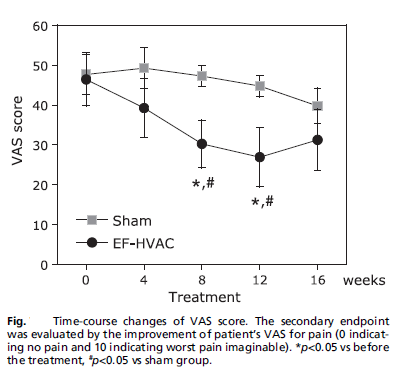Article
Static Electric Field Therapy by High Voltage Alternating Current Deemed Effective in Rheumatoid Arthritis
Author(s):
Though recent reviews were unable to provide evidence of efficacy for several complementary treatments for rheumatoid arthritis (RA), a group of researchers decided to clinically evaluate the effectiveness of static electric field therapy by high voltage alternating current (EF-HVAC) in the chronic inflammatory autoimmune disorder.

Even though recent reviews were unable to provide evidence of efficacy for several oral and topical complementary treatments for rheumatoid arthritis (RA), a group of researchers in Japan decided to clinically evaluate the effectiveness of static electric field therapy by high voltage alternating current (EF-HVAC) in the chronic inflammatory autoimmune disorder, given the method’s prevailing use in headache, shoulder stiffness, chronic constipation, and insomnia among patients who fail to respond to conventional therapies.
For their randomized, double-blind, sham-controlled study published in the July 2013 edition of the Journal of Clinical Biochemistry and Nutrition, Yuji Naito, MD, PhD, and colleagues from the Kyoto Prefectural University of Medicine treated 24 patients who fulfilled the American College of Rheumatology’s criteria for active RA diagnosis with either EF-HVAC therapy provided via medical equipment maker Cocoroca Corp.’s Legacis Plus System or sham therapy for 12 weeks, and then observed those patients for four weeks after treatment.
At baseline, four weeks, eight weeks, 12 weeks, and 16 weeks, the researchers calculated and compared the patients’ 28-joints disease activity scores based on C-reactive protein (DAS28-CRP), visual analogue scores (VAS) for pain, swollen joint scores, tender joint scores, modified health assessment questionnaire responses for arthritis functioning, as well as “changes in laboratory measures of biomarkers: erythrocyte sedimation rate (ESR), rheumatoid factor (RF), matrix metalloproteinase-3 (MMP-3), and CRP.”
Reviewing the results, the researchers found DAS28-CRP scores decreased gradually in the EF-HVAC patients during the 12 weeks of treatment; however, those scores did not significantly differ from the sham group’s DAS28-CRP scores at any point throughout the course of the study. On a brighter note, the EF-HVAC treatment group experienced significant declines in VAS scoring for pain and the number of tender joints at 12 weeks after treatment compared to the sham group, but since those lower VAS scores tended to reverse after the EF-HVAC treatment ended, the authors suggested “it would be necessary to continue the treatment to maintain the decrease in VAS scale.” (Figure)

“Complementary and alternative medicines are needed and more popular among patients to improve their RA quality of life,” the researchers concluded. “This study supports the decision to use EF-HVAC for 60 minutes daily during 12 weeks.”
The authors disclosed competing interests with Otsuka Pharmaceutical Co. Ltd., Takeda Pharmaceutical Co. Ltd., AstraZeneca Co. Ltd., Eisai Co. Ltd., Merck & Co. Inc., Dainippon Sumitomo Pharma Co. Ltd., Chugai Pharmaceutical Co. Ltd., and FUJIFILM Medical Co. Ltd.
Related Coverage:
Is Rheumatoid Arthritis Really on the Decline?
Rheumatology Community Calls for Collaboration to Fight Arthritis Comorbidities
Adalimumab Biosimilar Meets Primary Endpoint in Rheumatoid Arthritis Trial





